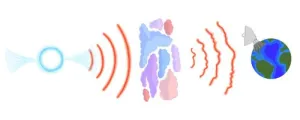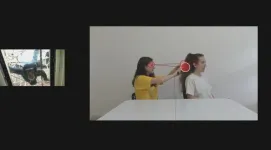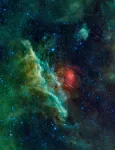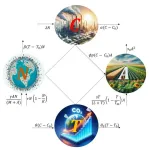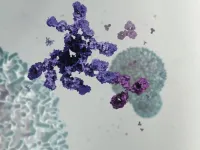Schlechter named Cancer Moonshot Scholar
2024-11-26
(Press-News.org) Chelsey Schlechter, MPH, PhD, Huntsman Cancer Institute investigator and assistant professor in the Department of Population Health Sciences at the University of Utah (the U), has been selected as a Cancer Moonshot Scholar.
Schlechter is one of only eleven researchers in the U.S. chosen for the prestigious program this year, which aims to both advance impactful cancer research and broaden the research workforce.
For the project, Schlechter and her team partnered with the Association for Utah Community Health and Utah Community Health Centers—organizations which aim to provide health care to historically marginalized populations—to test strategies to connect patients to evidence-based weight management programs. Better enrollment in these types of programs will contribute to cancer prevention, according to Schlechter. At least 13 types of cancer are related to obesity, per an expert report of the International Agency of Research in Cancer.
“I am incredibly lucky to collaborate with such great community partners, and this award will help further our joint mission to prevent cancer,” says Schlechter. “We also have the chance to answer impactful research questions and improve the health of populations that have been historically marginalized and often have limited access to these important preventive interventions.”
Schlechter and her team will use electronic health records, proactive outreach over text message, and patient navigation to enroll patients in digital weight management programs.
David Wetter, PhD, director of the Center for Health Outcomes and Population Equity (HOPE) and the Jon M. and Karen Huntsman Presidential Professor in the Department of Population Health Sciences at the U and Huntsman Cancer Institute, and Guilherme Del Fiol, MD, PhD, professor and vice-chair for research in biomedical informatics in the School of Medicine at the U, will also serve as primary investigators on the project.
“We are extremely excited about Dr. Schlechter’s selection as a Cancer Moonshot Scholar, as well as the project to address obesity among community health centers and their patients,” Del Fiol and Wetter said in a joint statement. “The project, SMARTLife Utah, will address the epidemic of obesity to improve health at the population level. Dr. Schlechter is an outstanding, highly collaborative scientist who deeply cares about the community. This project could not have a better leader, and this award is so well deserved.”
Neli Ulrich, PhD, chief scientific officer and executive director of the Comprehensive Cancer Center at Huntsman Cancer Institute, says she is proud of Schlechter’s accomplishment.
“Obesity increases the risk of multiple cancers, including of the breast, colon, and endometrium. Dr. Schlechter’s work is reflective of the depth of community-based research we prioritize at Huntsman Cancer Institute,” says Ulrich. “Being named a Cancer Moonshot Scholar is an incredible achievement, and I am excited to see how her research will guide cancer prevention here in Utah and throughout the Mountain West.”
The Cancer Moonshot program was founded in 2016 in an effort to accelerate cancer research. President Joe Biden created the Cancer Moonshot Scholars program in 2022.
The Cancer Moonshot Scholars program is funded by the National Cancer Institute. The research described in this release is supported by the National Institutes of Health/National Cancer Institute including P30 CA042014, and Huntsman Cancer Foundation.
About Huntsman Cancer Institute at the University of Utah
Huntsman Cancer Institute at the University of Utah (the U) is the National Cancer Institute-designated Comprehensive Cancer Center for Utah, Idaho, Montana, Nevada, and Wyoming. With a legacy of innovative cancer research, groundbreaking discoveries, and world-class patient care, we are transforming the way cancer is understood, prevented, diagnosed, treated, and survived. Huntsman Cancer Institute focuses on delivering a cancer-free frontier to all communities in the area we serve. We have more than 300 open clinical trials and 250 research teams studying cancer at any given time. More genes for inherited cancers have been discovered at Huntsman Cancer Institute than at any other cancer center. Our scientists are world-renowned for understanding how cancer begins and using that knowledge to develop innovative approaches to treat each patient’s unique disease. Huntsman Cancer Institute was founded by Jon M. and Karen Huntsman.
END
[Attachments] See images for this press release:

ELSE PRESS RELEASES FROM THIS DATE:
2024-11-26
A new study led by researchers at the University of North Carolina at Chapel Hill offers a solution to water scarcity during droughts amid the tug of economic development, population growth and climate uncertainty for water users in Western U.S. states. The proposed two-way leasing contracts would coordinate agricultural-to-urban leasing during periods of drought and urban-to-agricultural leasing during wet periods, benefiting both urban and agricultural water users.
“Water markets are an important tool for allocating water in the Western U.S., and other water-scarce regions around the world, but they are often slow to respond to drought, ...
2024-11-26
Alexandria, VA, USA - The Journal of Dental Research (JDR) has announced the publication of a new issue of Advances in Dental Research, a supplement to the Journal of Dental Research (JDR), entitled, "Women in Dental, Clinical, and Translational Research.”
The 2024 Annual Meeting of the American Association for Dental, Oral, and Craniofacial Research (AADOCR) and the Canadian Association for Dental Research featured a two-day “Meeting Within a Meeting” on the topic of “Women in Dental, Clinical, and Translational Research” organized by AADOCR Then- President Alexandre Vieira. During these sessions, speakers were challenged to reflect on ...
2024-11-26
Team Unlocks New Insights on Pulsar Signals
November 26, 2024, Mountain View, CA – Dr. Sofia Sheikh from the SETI Institute led a study that sheds new light on how pulsar signals—the spinning remnants of massive stars—distort as they travel through space. This study, published in The Astrophysical Journal, was performed by a multi-year cohort of undergraduate researchers in the Penn State branch of the Pulsar Search Collaboratory student club. Maura McLaughlin, Chair, Eberly Distinguished Professor of Physics and Astronomy, West Virginia University, created the Pulsar Search Collaboratory to engage ...
2024-11-26
Great apes track events with their eyes in the same way that humans do, according to a study published November 26th in the open-access journal PLOS Biology by Vanessa Wilson from the University of Neuchatel, Switzerland, and colleagues.
When watching a cat chase a mouse, humans will alternate looking at cat and mouse, using the information to connect the two into what’s called an agent-patient relationship—with the cat as the agent and the mouse as the patient. This cognitive mechanism is thought to be ...
2024-11-26
Routine screening to detect risk factors for heart disease dropped sharply during the COVID-19 pandemic in England, and some key measurements, such as blood pressure readings, may still lag behind pre-pandemic levels. These findings are reported in a new study by Frederick Ho and Naveed Sattar of the University of Glasgow, Scotland, UK, and colleagues published November 26th in the open-access journal PLOS Medicine.
During the COVID-19 pandemic, patients went without routine face-to-face health checks, which are important for detecting common cardiometabolic ...
2024-11-26
While NASA’s NEOWISE telescope ended its journey through space on Nov. 1, 2024, the team at IPAC, a science center at Caltech, was working on one further gift from the prolific mission.
The final data release from NEOWISE was released to the astronomy community just two weeks later, on Nov. 14, encompassing over 26 million images and nearly 200 billion sources detected by the telescope. And today, IPAC is releasing six new images from the mission’s archival data as a tribute to this landmark project, available here: https://www.astropix.org/link/3b2x
NEOWISE ...
2024-11-26
"Research in the last several decades has established endothelial cells (ECs) as a dynamic interface critical for vascular protection.”
BUFFALO, NY- November 26, 2024 – This editorial was published by Aging (listed by MEDLINE/PubMed as "Aging (Albany NY)" and "Aging-US" by Web of Science) in Volume 16, Issue 17, titled, “The silent protector: Nucleoporin93’s role in vascular health.”
Written by Julia Michalkiewicz, Tung D. Nguyen, and Monica Y. Lee from The University of Illinois at Chicago College of Medicine, ...
2024-11-26
WASHINGTON, Nov. 26, 2024 – Human activities are causing atmospheric carbon dioxide (CO2) levels to rise, which increases the global average surface temperature—and poses a threat to crop growth. Escalating concerns about climate change’s impact on global food security inspired researchers from Banaras Hindu University in India to create a way to explore how these factors influence crop yields.
In Chaos, from AIP Publishing, the researchers share a mathematical model created to capture the nonlinear relationships between CO2, temperature, human population, ...
2024-11-26
About The Study: This cohort study among individuals participating in a weight loss program found that nearly half of those consuming alcohol at baseline decreased their alcohol use after anti-obesity medication initiation. There may be properties of anti-obesity medications that lead to reduced use. For example, naltrexone decreases cravings for alcohol and glucagon-like peptide-1 receptor agonists (GLP-1 RAs) may attenuate the rewarding effects of alcohol, similar to food.
Corresponding Author: To contact the corresponding author, Lisa R. Miller-Matero, PhD, email lmatero1@hfhs.org.
To access the embargoed study: Visit our For The Media website at ...
2024-11-26
A multinational collaboration co-led by the Garvan Institute of Medical Research has uncovered a potential explanation for why some cancer patients receiving a type of immunotherapy called checkpoint inhibitors experience increased susceptibility to common infections.
The findings, published in the journal Immunity, provide new insights into immune responses and reveal a potential approach to preventing the common cancer therapy side effect.
“Immune checkpoint inhibitor therapies have revolutionised cancer treatment ...
LAST 30 PRESS RELEASES:
[Press-News.org] Schlechter named Cancer Moonshot Scholar

